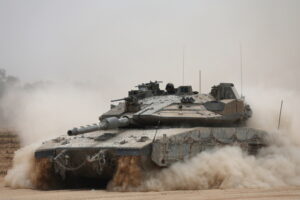International calls for de-escalation of the conflict between Israeli forces and Hezbollah intensified on Wednesday, as the Israeli Chief of Staff announced preparations for a potential ground invasion into Lebanon. This move is aimed at targeting the Iran-backed Shiite movement, raising concerns of a broader regional war.
“We are launching strikes throughout the day (…) to prepare for your possible entry (…) so that we can continue hitting Hezbollah,” Israeli Defense Chief General Herzi Halevi told his troops near the Lebanon border.
Hours later, Israel’s ambassador to the UN reiterated that the country prefers a diplomatic resolution to restore security along its northern border with Lebanon but warned that, “if diplomacy fails to allow our residents to return to their homes, we will use all available means, in accordance with international law.”
UN Secretary-General António Guterres, speaking during an emergency Security Council meeting, described the situation as an impending “hell on earth” and warned that Lebanon is “on the brink of the abyss” and must not become a new “Gaza.”
Iran: “We will support Beirut with all means necessary”
Iran, an ally of Hezbollah, declared its readiness to support Lebanon in the event of further escalation. Iranian Foreign Minister Abbas Araghchi warned that the Middle East is “on the edge of complete destruction” and accused Israel of crossing all red lines. Meanwhile, U.S. President Joe Biden, Israel’s key ally, cautioned again about the risk of a “widespread war” in the region, though the Pentagon noted that an Israeli ground invasion of Lebanon does not seem imminent.
Heavy Casualties and Mass Displacement
The Israeli military, which claims it is acting to enable the return of tens of thousands of northern residents displaced by Hezbollah’s attacks, continued its air raids for a third consecutive day, focusing on southern and eastern Lebanon, Hezbollah’s strongholds. Lebanon’s Health Ministry reported at least 72 deaths and 400 injuries, while the UN said more than 90,000 people have fled, many heading to Beirut or Syria.
Israeli forces stated they had struck over 2,000 Hezbollah targets since Monday, including hundreds on Wednesday alone. According to Lebanese authorities, over 1,247 people, mostly civilians, have died since the conflict began on October 8.
Israel is on High Alert
In Israel, air raid sirens went off in Tel Aviv, more than 110 kilometers from the Lebanon border, after Hezbollah launched a ground-to-air missile that was intercepted by Israeli forces. Hezbollah claimed it targeted the headquarters of Mossad, Israel’s intelligence agency, with a “Qader” missile.
Later that night, the “Islamic Resistance in Iraq,” a coalition of Iran-backed militias, claimed responsibility for a drone attack on a “strategic target” in Eilat, southern Israel. Israeli forces intercepted one drone and found a second one that crashed. Two people were lightly injured in the attack.
France and the U.S. Propose Temporary Ceasefire
In coordination with the U.S., France proposed a 21-day ceasefire in Lebanon to allow negotiations between Israel and Hezbollah. French Foreign Minister Jean-Noël Barrot announced this during the emergency UN Security Council session, promising that the proposal would be unveiled shortly.
The escalation follows a series of attacks against Hezbollah last week, including bombings of communication devices on September 17 and 18 that killed 39 and injured hundreds, and an Israeli airstrike on September 20 that killed 55, decimating Hezbollah’s elite Radwan unit leadership, including its commander, Ibrahim Akil.
Gaza Takes a Backseat
Meanwhile, the situation in Gaza continues to worsen. The region has endured nearly a year of relentless bombings since the war began on October 7, 2023, following Hamas’s unprecedented attack on southern Israel, which left 1,205 people dead. At least 97 hostages remain in Hamas captivity, although 33 have been declared dead by the Israeli military.
Since then, the Israeli government has vowed to destroy Hamas, with widespread military operations claiming the lives of over 41,495 Palestinians, mostly civilians, according to Gaza’s Health Ministry. The besieged enclave now faces a severe humanitarian catastrophe.
Ask me anything
Explore related questions





